#hasharon
Text
#Plumber in Hod Hasharon israel#Opening blockages israel#A plumber in Rosh Ha'Ain israel#Increasing water pressure isrrael#Plumber in Petah Tikva israel
1 note
·
View note
Text

During her arrest, Ayesh was subjected to assault, threats, and insults by Israeli soldiers, according to the Addameer human rights organisation. She was transferred to Israel’s Hasharon Prison before being later taken to Damon Prison, where she is now being held.
Ayesh’s work as a human rights defender rose to the fore during her time at the Ramallah-based Lawyers for Justice, representing Palestinian political detainees in PA prisons. In July, she attended a session on behalf of the group at the United Nations in Geneva, Switzerland.
Tala Nasser, from the Addameer prisoners’ rights group, explained that Ayesh’s arrest comes amid a “violent mass arrest campaign” carried out by Israel since October 7.
The fact that the vast majority of the more than 6,900 Palestinians arrested in the occupied West Bank and East Jerusalem since October 7 have been transferred to administrative detention highlights the arbitrariness of Israel’s arrests, she said.
“This campaign includes activists, human rights defenders and political leaders,” Nassar told Al Jazeera, noting that it is “an attempt to silence them and prevent the exposure of the occupation’s crimes across the whole country”.
In December, Israeli forces also arrested political and civil society leader Khalida Jarrar, who was similarly transferred to administrative detention.
Despite releasing all but three Palestinian female detainees during the latest prisoner exchange with Hamas at the end of 2023, the Israeli army rearrested dozens. Some 80 female prisoners are being held today, all of whom are in the Damon Prison.
Among the 80 are dozens of women from the besieged Gaza Strip, but lawyers are forbidden from visiting them or knowing anything about them.
Several reports have emerged of female detainees from Gaza being physically beaten and abused, including an unknown number of them being held at Israeli military bases and not in prison.
Lawyers say conditions for all Palestinian detainees, including women, are unprecedentedly difficult. Eight Palestinian male prisoners have also died or were killed in Israeli custody since October 7, most of them in the days and weeks after their arrest.
Over the past few months, many videos have emerged of Israeli soldiers stripping, torturing and abusing male prisoners from both the occupied West Bank and the Gaza Strip.
“It is important to note that every female that is arrested is violated in one way or another,” said Nasser. “They are all facing threats, intensive strip searches, verbal assault and physical violence.”
(continue reading)
#politics#palestine#gaza#diala ayesh#israel#political prisoners#israeli hostages#human rights abuses#administrative detainees
656 notes
·
View notes
Text
Berlin, Germany – A Palestinian employee of Germany’s state-funded development agency has been imprisoned in Israel for more than a month, where she has been beaten and subject to abusive and humiliating treatment, her family members and lawyer say.
Baraa Odeh, 34, works for the German Agency for International Cooperation (GIZ), and was detained by Israeli border guards on March 5 while returning to her home in Ramallah from a work trip to Germany.
She has since been sentenced to three months of administrative detention without charge.
Neither her husband, who is a German national, nor her family have had direct contact with Odeh since her arrest.
“Our life is upside down,” her sister Shireen Odeh told Al Jazeera, adding that her family is extremely concerned for her wellbeing.
“The only thing we do is think about her. We haven’t had a normal life since they arrested her.”
Mahmoud Hassan, a lawyer for Odeh who has spoken to her in prison, said she has been physically assaulted and subject to inhumane conditions.
“When she arrived [at Hasharon] prison, she was strip-searched while the policewoman was shouting at her. She was kept in a cell and later, a policeman that also shouted at her beat her on her leg,” said Hassan, who works with Addameer Prisoner Support, an NGO that supports Palestinian prisoners.
“The policeman pushed her to the corner and the keys he had injured her hand. He kicked her. She said she had marks on her chest. He was threatening to keep her in this cell overnight.
“After a couple of hours, he took her to another room that was not clean and was very cold.”
The second room had security cameras. The toilet was so dirty that Odeh refused to use it. She was then transferred to the overcrowded Damon prison and strip-searched again.
According to reports, detainees at the site have said it is difficult to access medical care or clean clothes. Guards have allegedly blindfolded and handcuffed prisoners when they are moved, and prevented them from sleeping.
Israel has regularly detained and imprisoned workers for Palestinian aid organisations, and sometimes UNRWA, but it is unusual for the Israeli army to hold an employee of a Western organisation such as the GIZ under administrative detention.
Since October 7, when the Israel-Palestine conflict escalated, Israel has sharply increased the arrest of Palestinians in the West Bank. Most have been held under administrative detention, without being charged or given due process. Administrative detention orders are often extended, sometimes for years.
Prisoner rights groups and released detainees have raised the alarm on Israel’s systematic use of torture in its prisons, especially in recent months.
Israel has arrested 8,425 Palestinians, including about 280 women and 540 children, in the West Bank and East Jerusalem between October 7 and April 22, according to Addameer. Some 5,210 administrative detention orders have been issued during the same period, while 16 prisoners have died in Israeli prisons.
Meanwhile, Israel has prevented the Red Cross from making humanitarian visits to prison detainees since October 7.
352 notes
·
View notes
Text
"The Commission of Detainees and Ex-Detainees Affairs and the Palestinian Prisoners Club revealed that 'Israel' is detaining 142 female prisoners from Gaza, including infant girls and elderly women, in 'Israeli' prisons. These detentions occurred during the ground invasion of Gaza.
The prisoners are held in several prisons, including 'Damon' and 'Hasharon,' according to the available data.
The prisoners' institutions previously issued a statement stating that the 'Israeli' occupation commits horrendous and terrible crimes against the detainees from Gaza, in addition to refusing to disclose their fate in terms of their numbers, places of detention, and health conditions.
In light of the shocking and horrifying pictures and testimonies that emerged from citizens recently arrested from Gaza, concerns about their fate are escalating day by day. The institutions do not rule out the possibility of the occupation carrying out field executions against detainees from Gaza.
The occupation's prison administration announced at the end of November that there are 260 detainees from Gaza, categorized as 'illegal fighters.'
The fascist minister Ben-Gvir, as part of systematic torture and abuse, requested the prison administration to transfer detainees from Gaza to the 'Rikuvit' section, located under the 'Nitzan Ramla' prison, known for being one of the worst and oldest prisons."
10 Dec 23 via RNN Prisoners
More on Nitzan Ramla prison:
286 notes
·
View notes
Text
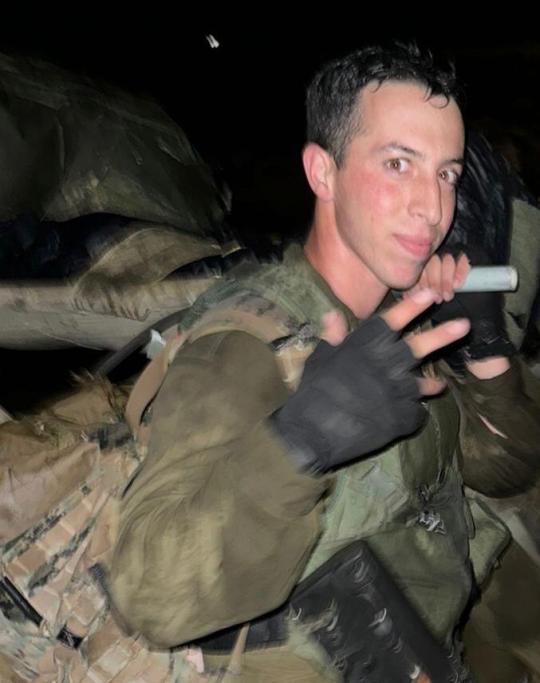
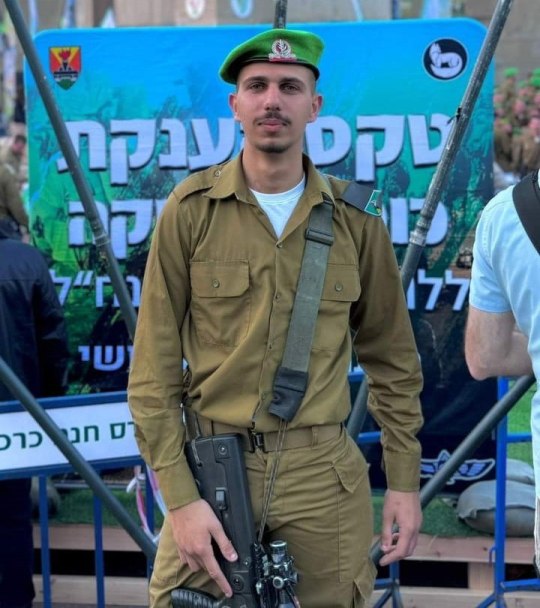
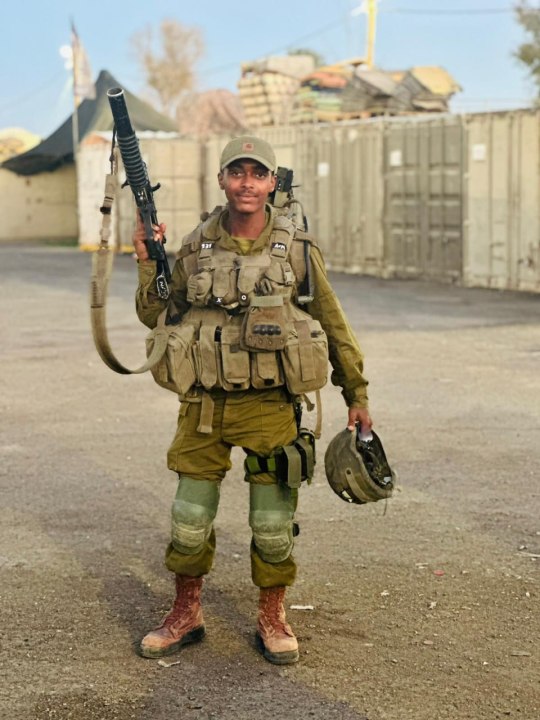
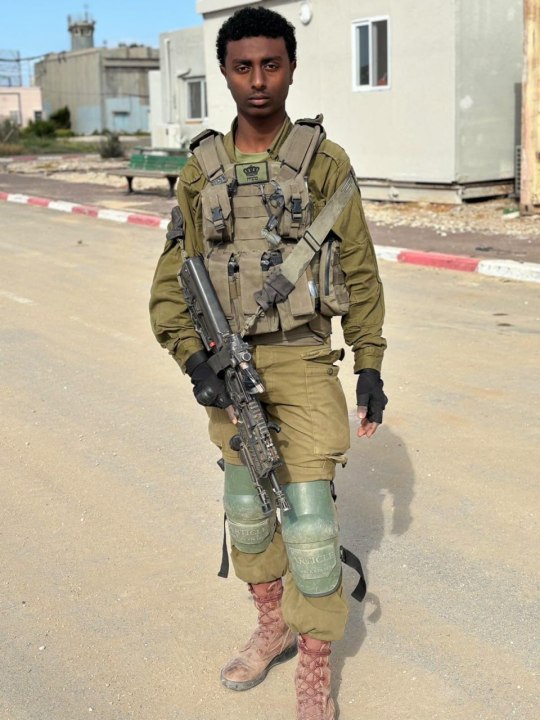
Four Israeli soldiers were killed during fighting against Hamas in Gaza City's Zeitoun neighborhood this morning, the military announces.
The troops are named as:
Sgt. Itay Livny, 19, of the Nahal Brigade's 931st Battalion, from Ramat Hasharon.
Sgt. Yosef Dassa, 19, of the Nahal Brigade's 931st Battalion, from Kiryat Bialik.
Sgt. Ermiyas Mekuriyaw, 19, of the Nahal Brigade's 931st Battalion, from Beersheba.
Sgt. Daniel Levy, 19, of the Nahal Brigade's 931st Battalion, from Kiryat Motzkin
Another officer and soldier of the 931st Battalion were seriously wounded in the same incident.
According to an initial IDF probe, the four soldiers were killed by an explosive device or devices in an alleyway.
The troops had been raiding a school complex where the military had indications of Hamas activity. Weaponry and at least one tunnel was discovered in the area of the school.
Separately, another two soldiers of the 401st Armored Brigade's 9th Battalion were seriously wounded by RPG fire on a tank in the Rafah area of southern Gaza.
May their memories be a blessing.
54 notes
·
View notes
Text

#interior design#architecture#myhouseidea#home decor#decor home#kitchen#bedroom#houseidea#house idea#living
94 notes
·
View notes
Text



House in Hod Hasharon / Architect Yaron Eldad
18 notes
·
View notes
Text
Israeli teen jailed for refusing draft: ‘I’m willing to pay a price for my principles’
Ben Arad, 18, is the third conscientious objector imprisoned since October 7. He tells +972 why Israel’s assault on Gaza propelled him into action.
By Oren Ziv April 5, 2024
“Since the war began, I understood that I have an obligation to make my voice heard, and to call for an end to the cycle of violence.” These were the words of Ben Arad, an 18-year-old Israeli conscientious objector, shortly before he reported to the Israeli army’s recruitment center near Tel Aviv on April 1 and declared his refusal to enlist in mandatory military service, in protest of Israel’s bombardment of Gaza and the long-standing occupation.
Arad is the third Israeli teenager to publicly refuse the draft for political reasons since October 7, and was tried and sentenced to an initial 20 days in military prison. He follows Tal Mitnick, who has served 105 days in prison across three sentences, and Sofia Orr, who has served 40 days in prison across two sentences — neither of whom have yet been exempted from military service, meaning they may still be sentenced to further stints in prison.
Born in Ramat Hasharon not far from Tel Aviv, Arad has spent the past few months volunteering at Kibbutz Mashabei Sadeh in the Negev/Naqab desert, where he worked with youth from the kibbutz and in schools in the nearby Bedouin village of Bir Hadaj. Like many other Israeli teens completing what is known as a “year of service” before the army this year, Arad was informed that the program had been cut short due to the war, and that he would therefore have to enlist in the army in April rather than December.
In an interview with +972 Magazine and Local Call prior to his sentencing, Arad explained that he never defined himself as an “activist” until now, and that watching Israel’s destruction of the Gaza Strip — which he described as “an unprecedented murder campaign not only against Hamas but against the entire Palestinian people” — convinced him of the need to refuse.
“The killing of civilians in Gaza, the hunger, the disease, the destruction of property, [in addition to] settlers’ crimes in the occupied territories — they all add fuel to the flame of hatred and terror,” he said. “Fighting will not bring back the hostages. It will not resurrect the dead. It will not liberate the Gazans from Hamas’ control, and it will not bring peace.”
The following interview has been edited for length and clarity.
24 notes
·
View notes
Text

Roman Soldiers 1,600-Year-Old Oil Lamp Found in Israel
The lamp was used by Roman soldiers guarding a fort on the Scorpions Ascent; an identical lamp was discovered in the same spot 90 years ago.
Sixteen year-old Yonatan Frankel, a pupil from the Tamar High School in Hod Hasharon, was with his class on an annual field trip along the Scorpions Ascent in southern Israel. When his class stopped for lunch next to the Late Roman fort of Mezad Tzafir, Yonatan began to pick up rocks from the sand to look at them.
“One of the stones that I picked up was full of dirt. I shook it off, and suddenly I saw a design. Then, I understood that this was a man-made object and not just a stone,” he recalled.
Yonatan brought the lamp to his teacher, who showed it to their guide. The guide ensured that the find was transferred to the Sub-district Archaeologist of the Israel Antiquities Authority’s Southern Negev District, Alex Freiberg. Yonatan received a certificate of merit for his discovery and for good citizenship.


The oil lamp discovered at Mezad Tsafir was produced in Petra in Jordan in the 4th-5th centuries CE. When IAA senior researcher Dr. Tali Erickson-Gini saw the lamp, which was only partially intact, she was quite excited.
“Lamps of this type were uncovered at Mezad Hazeva, and also at Mamshit, Mezad Yotvata and Petra, but the lamp Yonatan found is identical to one discovered at in the same place 90 years ago (!) by archaeologist Nelson Glueck,” she said.
“We know that between the Nabataean-Roman town of Mamshit and the copper mines of Feinan (biblical Punon) in the Central Arava – not far from present-day Moshav ‘En Yahav, a trade route was in use in the 4th-6th centuries CE. In order to secure the shipments of copper, and possibly even gold from the mines, a series of forts were built between the head of the Scorpions Ascent and Mezad Hazeva, and Mezad Tsafir was one of these. Mounted patrols guarded the important road. It is easy to imagine the lamp lighting up the darkness in the lonely, isolated fort manned by Roman soldiers.”

#Roman Soldiers 1600-Year-Old Oil Lamp Found in Israel#roman oil lamp#Roman fort of Mezad Tzafir#ancient artifacts#archeology#archeolgst#history#history news#ancient history#ancient culture#ancient civilizations#ancient israel#israeli history#roman history#roman empire
22 notes
·
View notes
Text
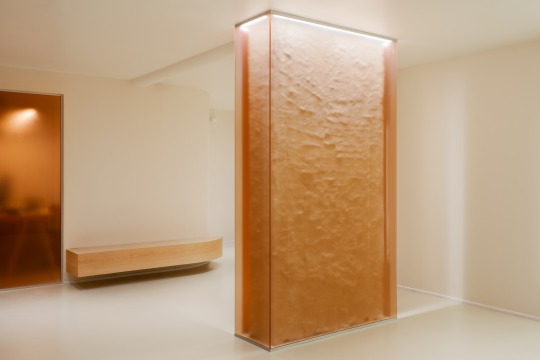
The Clinic is a minimalist space located in Ramat Hasharon, Israel, designed by Salty Architects. The 180-square-meter clinic includes three treatment rooms, a surgery room, a CT room, and a laboratory, all tailored to meet the needs of both patients and staff efficiently. Despite its compact layout, the clinic’s design fosters a sense of spaciousness and tranquility.
8 notes
·
View notes
Text
Five more brave soldiers lost their lives defending Israel.
- Sgt. Amit Moshe Shachar, 25, from Ramat Yochanan, Combat Engineering Corps’ Yahalom unit.
Capt. Denis Krokhmalov Veksler, 32, from Be’er Sheva, an officer in the Combat Engineering Corps’ Yahalom unit.
- Capt. Ron Efrimi, 26, from Hod HaSharon, an officer in the Combat Engineering Corps’ Yahalom unit.
- Master Roi Avraham Maimon, 24, from Afula, a combat paramedic in the Yahalom unit.
- Sgt. Maj. Avkiva Yasinsky, 35, from Ramat Gan, Combat Engineering Corps’ 8173rd Engineering Battalion.
*May their memory be a blessing.*
16 notes
·
View notes
Text
Mahmoud Hassan, a lawyer for Odeh who has spoken to her in prison, said she has been physically assaulted and subject to inhumane conditions.
“When she arrived [at Hasharon] prison, she was strip-searched while the policewoman was shouting at her. She was kept in a cell and later, a policeman that also shouted at her beat her on her leg,” said Hassan, who works with Addameer Prisoner Support, an NGO that supports Palestinian prisoners.
“The policeman pushed her to the corner and the keys he had injured her hand. He kicked her. She said she had marks on her chest. He was threatening to keep her in this cell overnight.
“After a couple of hours, he took her to another room that was not clean and was very cold.”
The second room had security cameras. The toilet was so dirty that Odeh refused to use it. She was then transferred to the overcrowded Damon prison and strip-searched again.

7 notes
·
View notes
Text
On 12 November 2023, my father called and told me representatives of the authorities had come to our house and handed over a summons for interrogation for me. My father refused to give them my address, and managed to persuade them that they didn’t need to go get me and he’d bring me to the police station.
That same day at 6:00 P.M. I went to the police station with my father. He waited for me outside, but as soon as I went in they handed me an arrest warrant. The moment I entered, the police officers started humiliating me, shouting at me that I was a terrorist supporter and mocking my appearance. They took away all my belongings, including my phone and shoelaces. Then my hands were tied in front of me with metal handcuffs.
I gathered from the arrest warrant that I was suspected of identifying with terrorist organizations and supporting terror. I demanded to speak with my lawyer, and they let me. The lawyer calmed me down and explained that I was allowed to maintain my right to remain silent and refuse to answer questions. Then they put me, handcuffed, in a room where a lot of officers, male and female, were sitting and smoking. One of them put his phone close to my face and took a photo of me. When I told him, "You have no right to photograph me," he answered: "I’ll go outside and tell your father you’re impolite." They all made fun of me, whispering and giggling.
Then they took me to a vehicle that drove off. They didn’t tell me where we were going, but when we got there I saw a sign saying Hasharon Prison. I asked what time it was and they said it was about 11:00 P.M. I was frightened and anxious. I was received by a male and female prison guard, and the female police officer who escorted me from the police station was also there. They kept mocking me and making fun of me because of a photo of me in a hijab that they had on their computer. I walked slowly, because they’d taken my shoelaces and I was afraid that if my shoes fell off, they wouldn’t let me put them back on. So they pushed me the whole way. The worst was the strip search. I didn’t expect them to do such a thing to me – to search me entirely naked. They made me kneel, naked, so they could see I wasn’t hiding anything. It was so humiliating. I asked the female guard and the female police officer to let me sit half crouching, so I could cover my body a bit. The female guard made fun of my clothes, the shape of my body, and my body hair. She made it clear that I disgusted her.
I thought of my father. I wondered whether he was still waiting for me outside the police station or already knew I’d been arrested and wasn’t even in Haifa but in prison outside the city. Everything was disturbing, insulting and degrading. They did everything in the most offensive way possible. […] When I got to the cell, the other female inmates were already asleep. There were four beds and another three inmates sleeping on the floor. […] Early in the morning, the other inmates woke up and we introduced ourselves. They were from the West Bank.
They explained the prison routine – a naked strip search every day, in the shower inside the cell. They said I had to be careful not to upset the female guards, so they wouldn’t beat me. They said, for example, that the guards would beat me if they asked questions and didn’t like my answers, or if I stayed silent and didn’t answer at all, since they considered that a provocation. I couldn’t believe it – how could such a thing happen? Where were we? Something inside me just didn’t want to believe it was possible. […] A bit later, three female guards came into the cell, and a male guard stood at the doorway and watched. Just then, I spoke to one of the inmates and smiled at her. One of the female guards didn’t like that and shouted at me, in Hebrew, "Why are you laughing?" I answered that it was just the shape of my face, and got angry. She led me to the shower and ordered me to undress. She asked where I was from, and why I was there. She told me several times "You're Hamas," and when she didn’t like my answers, she pulled my hair, grabbed me by the jaw, said I had a big mouth and twisted my head and neck, yelled at me and shoved me several times.
On my second night there, one of the inmates had itchy arms and a rash appeared on her body. She was scratching so hard that none of us could sleep. We banged on the door and asked that they let her see the medic, whose room was close to our cell, but no one answered. That night, we also banged the door to ask for pads for another inmate who was menstruating. A female guard came and threw our roll of toilet paper at us. She said, "You’re not in a hotel." In the morning, during roll call and the search, the female guards asked, "Who banged on the door at night?" We all kept quiet. The male guard pointed to the inmate who had demanded pads, and then they took her to the shower and strip searched her naked. We heard her shouting and understood they were hitting her.
While I was there, I attended a legal hearing on Zoom. There were two male guards in the room talking to each other, and I couldn’t hear a thing. I asked them to speak quietly but they didn’t listen to me, and one of them even turned the volume of my speaker down. I gestured to the lawyer that I couldn’t hear anything and he came closer to the camera, spoke slowly and gestured until I understood they had extended my detention by another three days, and that I would be transferred to Damun Prison. […] The conditions were awful there, too. There were a lot of female inmates there. I gathered from them that at the start of the war in Gaza, the prison administration had confiscated all their belongings. They left them nothing. They took away their clothes and electrical appliances, including radios, and the kitchen utensils they used to cook and to prepare coffee and tea. The canteen was also closed. Before that, the inmates prepared their own food, but under the new order they brought us prepared food, which was really terrible and the amounts were too small. […]
In early 2024, I resumed my studies. I was really scared Jewish students would attack me, especially since there was a group of right-wing students who had campaigned and demanded we be expelled from the university, persecuted and punished. Many students now attend classes armed with rifles and guns, and enter lecture halls like that. I often sit next to someone armed like that during a lecture. It’s a really scary situation, especially in a reality of ongoing incitement against Arab students.
Stories like those of Zuabi and I.A., along with countless other Palestinians, Palestinian citizens of Israel, and Jewish citizens of Israel detained for posting online, are unlikely to resonate with Musk, who has shown himself to be quite selective in his appreciation of free speech. In 2023, Musk complied with a raft of requests from the Indian government of Narendra Modi to censor his critics online, even removing a BBC documentary from the platform that raised questions about his involvement in crimes against humanity while he was head of the Indian state of Gujarat.
Musk has recently visited Israel, and also reportedly appeared as a guest of Israeli Prime Minister Benjamin Netanyahu during his recent speech at Congress. While the tech billionaire continues to pick fights globally over speech rights, he has remained silent about an aggressive campaign to shut down online criticism by his friends in the Israeli government.
4 notes
·
View notes
Note
ALSOOO you weaponizing sexual orientation so you can be islamophobic when same-sex marriage is straight-up illegal in israel plus you can’t even marry someone outside your own faith there 😭😭😭 you’re just a bit dim eh love
and you’re selling your work??? LMFAOOOO I DIDN’T EVEN KNOW but now that i do, i pity anyone who actually buys hardcopies of your shit groomer fanfiction 😭 and of course you use AI, just adding that to your list of shining qualities
Islamaphobic? You mean the person who just got done putting together a shipment of feminine hygiene products for women in palestine? You're hilarious. I have never used sexual orientation against anything but hamas, who literally hunted down and killed a gay man from Palestine who was seeking ayslum in Israel.
Same sex marriage was banned in the us until literally Obama's administration, but just like in israel, it's not condemned by literal death. You're so misinformed it's crazy. I've literally been tagged on pictures from my best friend in israel where she attended a pride parade in had hasharon.
You are time and again proving just how uneducated and brainwashed you are. Hop off babe.
(Btw every time you send in something about my 'groomer fanfiction', it's just free advertising for me, sooooo)
9 notes
·
View notes
Text
Video on Reddit:
Prominent Palestinian prisoner Israa Jaabis makes a statement upon her long-overdue release.
by u/iwasasin inPalestine
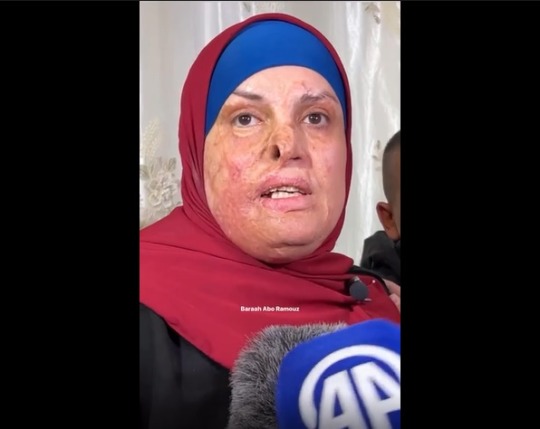
(Screencap)
The video is not translated, however, this is a comment from the OP:
On the day of the accident, October 11, 2015, one day before the final submission of her project for the Special Education module. Israa’ drove from Jericho to Al-Quds in a small car that was overflowing with household items. She was moving to Jerusalem with her son, Mu’tasim, and, by transporting some of the small furniture, she had hoped to save on moving expenses.
One of the items that Israa’ carried with her was a propane tank for the kitchen. It would have been too expensive to buy a brand new one in Jerusalem. As she was leaving Jericho, the engine of her car died twice. Young people in the town warned her to turn around and find another form of transportation, but she did not heed their advice. She needed to get to Jerusalem to her new job at a nursing home. Each time her car died, the engine emitted a burning smell.
After travelling a couple of kilometers outside the Israeli Al-Za’ayem military checkpoint, near the illegal Jewish settlement of Ma’ale Adumim and a short distance east of Al-Quds, Israa’s car died again. No soldiers or army vehicles were in sight. A while later, a retired Israeli police officer passed by her stalled car. He parked his car in front of hers and asked for her ID as she desperately tried to restart the car. “There is a strong smell in the car,” she told him, trying to exit the car, but he insisted that she stay inside while he examined her papers.
She tried to open the windows, but they, too, were affected by the electrical failure. Again, she tried to exit the car, opening the door, but the officer rushed over and slammed it shut, crushing her hand. She yelled “Allahu Akbar ’alaiku” (God is greater than you are), chastising him several times for not allowing her to escape. She urged him to let her out as fire ignited in the front part of the car. He refused. He stood there, watching her burn inside. The airbag deployed, completely trapping her inside the blazing car.
The police officer who stopped her claimed that she was trying to use the propane tank to blow up the car. His testimony was the only one considered in the Israeli court, and Israa’ was branded a ‘terrorist.’ She was sentenced to 11 years in prison. While serving her term at HaSharon prison inside Israel, she was repeatedly denied much needed medical attention causing her to lose fingers and her health to deteriorate significantly.
8 notes
·
View notes
